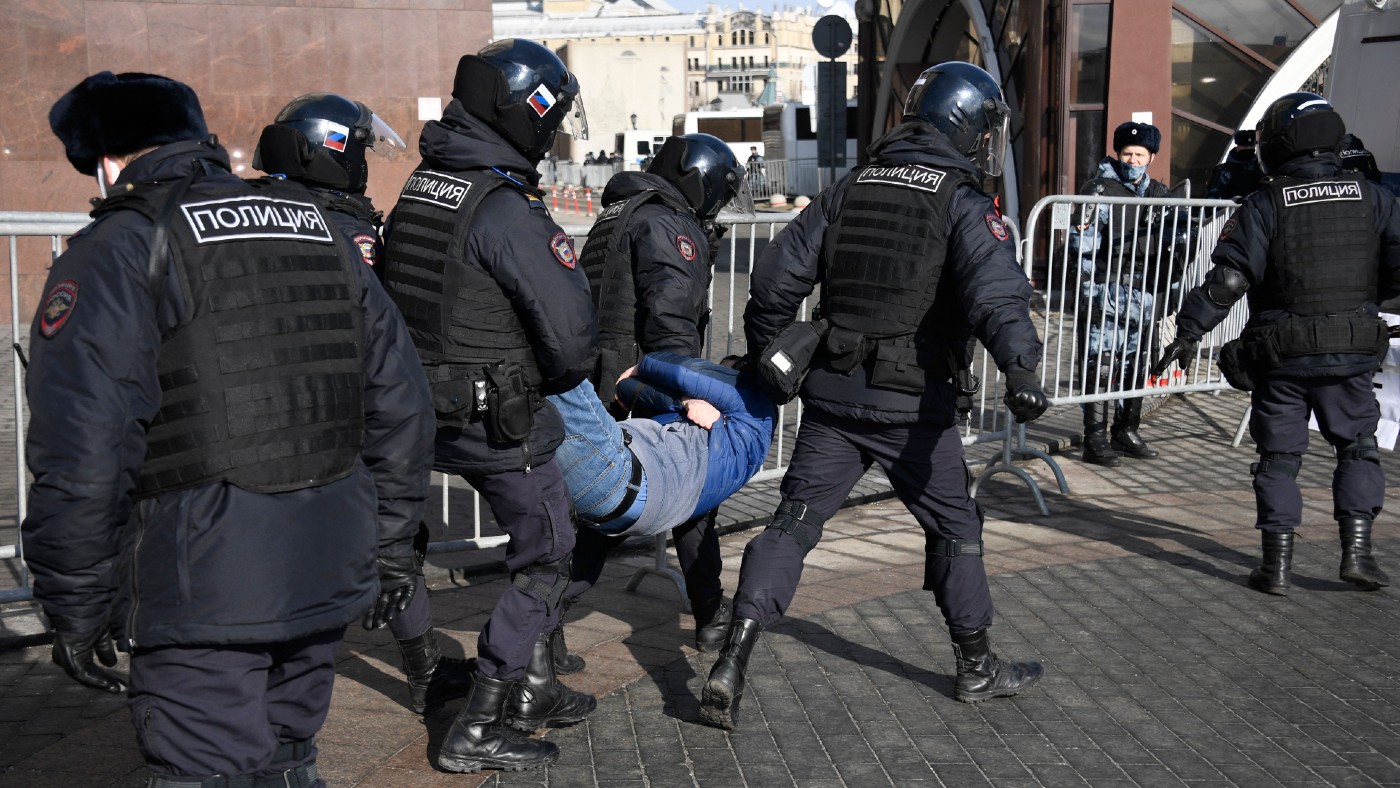Is Russia turning back into the USSR?
Many young Russians are scrambling to ‘adjust to a country they hardly recognise’

A free daily email with the biggest news stories of the day – and the best features from TheWeek.com
You are now subscribed
Your newsletter sign-up was successful
Barely three weeks into Vladimir Putin’s war on Ukraine, many young Russians are scrambling to “adjust to a country they hardly recognise”, said Felix Light and Peter Conradi in The Sunday Times. Some 14,000 people have been arrested at anti-war protests across the country; rumours swirl of police seizing people’s phones to check what they’ve been reading. Access to social networks like Facebook and Instagram is blocked; Twitter is “severely restricted”. On top of that, 300 foreign brands – including, as of last week, Disney and Uniqlo – have pulled out of Russia, an exodus that has cost thousands of Russians their jobs. For those who recall the dark days of the Soviet Union, this newfound global isolation must feel all too familiar; for the rest, “the speed of the country’s descent into pariah status has been dizzying”.
Many Russians now feel they have no choice but to flee their homeland, said Ben Judah in The Sunday Telegraph. Already, up to 200,000 of its “brightest and most dynamic” citizens have left primarily for Georgia and Armenia; many more, fearing the dawn of “a dark new era” of repression and ruin, will follow. They’re right to worry, said Larry Elliott in The Observer. Crippled by sanctions, Russia’s economy could face its sharpest decline “since the collapse of the Soviet Union”. There are already warnings Russia will try to repay the $117m interest it owes to foreign lenders in roubles – a move that would be viewed as a de facto default and an admission that it cannot service foreign debts.
The danger is that the West’s plan to financially squeeze and isolate Russia backfires, said Charlene Rodrigues in The Independent. Even some moderate Russians are starting to turn against the West as sanctions bite; older people nostalgic for the USSR are actually attracted to the idea of getting “more self-reliant” and less Western-facing. “Putin had to be sanctioned”, said Sunny Hundal in the same paper. But the corporate exodus from Russia in recent weeks, along with Putin’s crackdowns, means “a generation of Russians will grow up with limited access to Western culture and ideas.” That will be bad not just for Russia, but for everyone.
The Week
Escape your echo chamber. Get the facts behind the news, plus analysis from multiple perspectives.

Sign up for The Week's Free Newsletters
From our morning news briefing to a weekly Good News Newsletter, get the best of The Week delivered directly to your inbox.
From our morning news briefing to a weekly Good News Newsletter, get the best of The Week delivered directly to your inbox.
A free daily email with the biggest news stories of the day – and the best features from TheWeek.com
-
 Antonia Romeo and Whitehall’s women problem
Antonia Romeo and Whitehall’s women problemThe Explainer Before her appointment as cabinet secretary, commentators said hostile briefings and vetting concerns were evidence of ‘sexist, misogynistic culture’ in No. 10
-
 Local elections 2026: where are they and who is expected to win?
Local elections 2026: where are they and who is expected to win?The Explainer Labour is braced for heavy losses and U-turn on postponing some council elections hasn’t helped the party’s prospects
-
 6 of the world’s most accessible destinations
6 of the world’s most accessible destinationsThe Week Recommends Experience all of Berlin, Singapore and Sydney
-
 Corruption: The spy sheikh and the president
Corruption: The spy sheikh and the presidentFeature Trump is at the center of another scandal
-
 Putin’s shadow war
Putin’s shadow warFeature The Kremlin is waging a campaign of sabotage and subversion against Ukraine’s allies in the West
-
 The fall of the generals: China’s military purge
The fall of the generals: China’s military purgeIn the Spotlight Xi Jinping’s extraordinary removal of senior general proves that no-one is safe from anti-corruption drive that has investigated millions
-
 Epstein files topple law CEO, roil UK government
Epstein files topple law CEO, roil UK governmentSpeed Read Peter Mandelson, Britain’s former ambassador to the US, is caught up in the scandal
-
 Iran and US prepare to meet after skirmishes
Iran and US prepare to meet after skirmishesSpeed Read The incident comes amid heightened tensions in the Middle East
-
 Syria’s Kurds: abandoned by their US ally
Syria’s Kurds: abandoned by their US allyTalking Point Ahmed al-Sharaa’s lightning offensive against Syrian Kurdistan belies his promise to respect the country’s ethnic minorities
-
 Israel retrieves final hostage’s body from Gaza
Israel retrieves final hostage’s body from GazaSpeed Read The 24-year-old police officer was killed during the initial Hamas attack
-
 China’s Xi targets top general in growing purge
China’s Xi targets top general in growing purgeSpeed Read Zhang Youxia is being investigated over ‘grave violations’ of the law